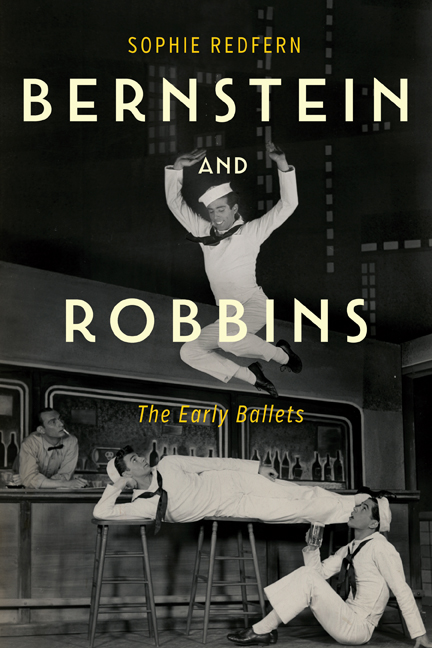Book contents
- Frontmatter
- Dedication
- Contents
- List of Illustrations
- Acknowledgments
- List of Abbreviations
- Editorial Note
- Preface
- 1 Setting the Scene: American Ballet and Jerome Robbins
- 2 Toward a First Ballet: Fancy Free Takes Shape
- 3 Creating Fancy Free: A Long-Distance Collaboration
- 4 The Music of Fancy Free: The Sketches and Score Explored
- 5 The Fancy Free Premiere and a Move to Broadway
- 6 Toward a Second Ballet: Bye Bye Jackie and the Creation of Facsimile
- 7 The Music of Facsimile: The Sketches and Score Explored
- 8 The Facsimile Premiere and Legacy of the Ballets
- Epilogue: Bernstein and Dance
- Bibliography
- Index
Preface
Published online by Cambridge University Press: 23 March 2021
- Frontmatter
- Dedication
- Contents
- List of Illustrations
- Acknowledgments
- List of Abbreviations
- Editorial Note
- Preface
- 1 Setting the Scene: American Ballet and Jerome Robbins
- 2 Toward a First Ballet: Fancy Free Takes Shape
- 3 Creating Fancy Free: A Long-Distance Collaboration
- 4 The Music of Fancy Free: The Sketches and Score Explored
- 5 The Fancy Free Premiere and a Move to Broadway
- 6 Toward a Second Ballet: Bye Bye Jackie and the Creation of Facsimile
- 7 The Music of Facsimile: The Sketches and Score Explored
- 8 The Facsimile Premiere and Legacy of the Ballets
- Epilogue: Bernstein and Dance
- Bibliography
- Index
Summary
Leonard Bernstein described himself as a “born collaborator,” and his extensive legacy as a composer for the stage is testament to his love of the theatre and of working with others. Arguably, his most significant theatrical partnership was with dancer, choreographer, and director Jerome Robbins. Over the course of thirty years they created three ballets, Fancy Free (1944), Facsimile (1946), and Dybbuk (1974), and two musicals, On the Town (1944) and West Side Story (1957). Today, West Side Story stands as their most celebrated work, a landmark show widely considered a turning point in the history of the Broadway musical, but it was during an exciting period in the mid-1940s that their stage careers were launched and relationship established. With their first work, the ballet Fancy Free, they not only formed a partnership that would go on to transform the popular theatre, but also defined the American vernacular in dance. As one reviewer in 1944 wrote: “[Fancy Free is] the farthest point yet reached by native American dance. Excitingly composed to the music of Leonard Bernstein, it utilizes perfectly all the freedom of modern dance technique, is soundly and truly United States and expresses exactly the American character.” Twenty-three years later Clive Barnes described it as likely “one of the most remarkable and definitive debuts in ballet history. No one could look at Fancy Free and not notice that something had happened.” This was no small feat for two twenty-five-year-olds with little previous professional experience.
Fancy Free was quickly followed by a transition to Broadway, where the pair scored a hit with On the Town, but the impact of their success started to take its toll: their next planned work was a ballet sequel to Fancy Free to be called Bye Bye Jackie, but this faltered and was never produced. Their actual second ballet, Facsimile, came about more by accident than design, with Bernstein called in as a last-minute—and usefully starry-named— replacement for the original composer, Paul Bowles. After Facsimile, it was four years before Bernstein wrote for the theatre again (his incidental music for Peter Pan in 1950) and eleven years before he and Robbins premiered a new work together (West Side Story).
- Type
- Chapter
- Information
- Bernstein and RobbinsThe Early Ballets, pp. xxiii - xxxPublisher: Boydell & BrewerPrint publication year: 2021

